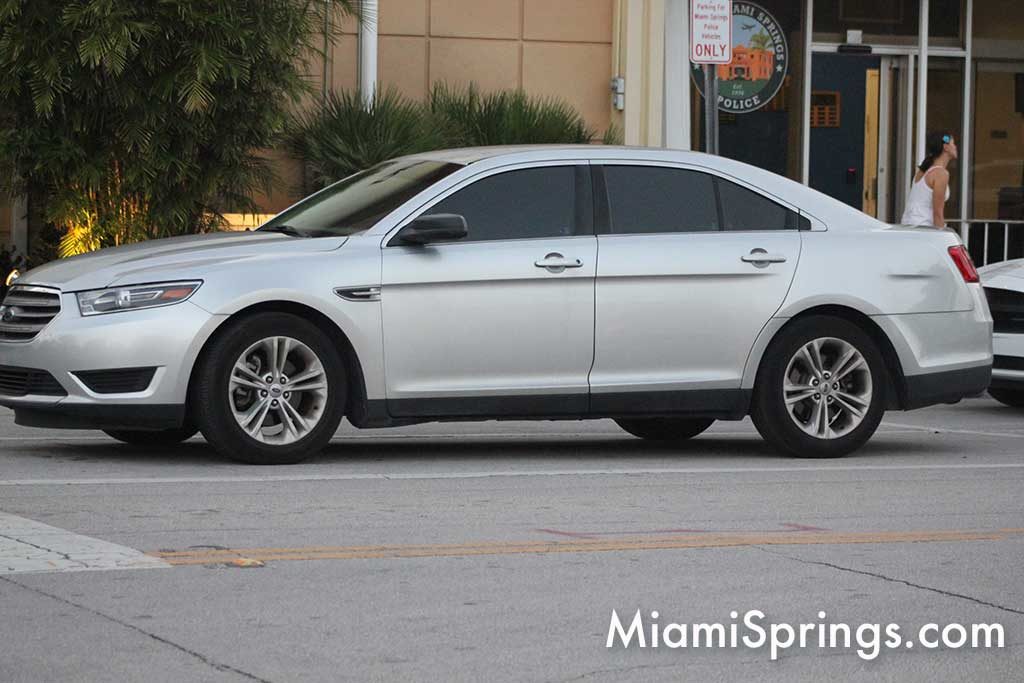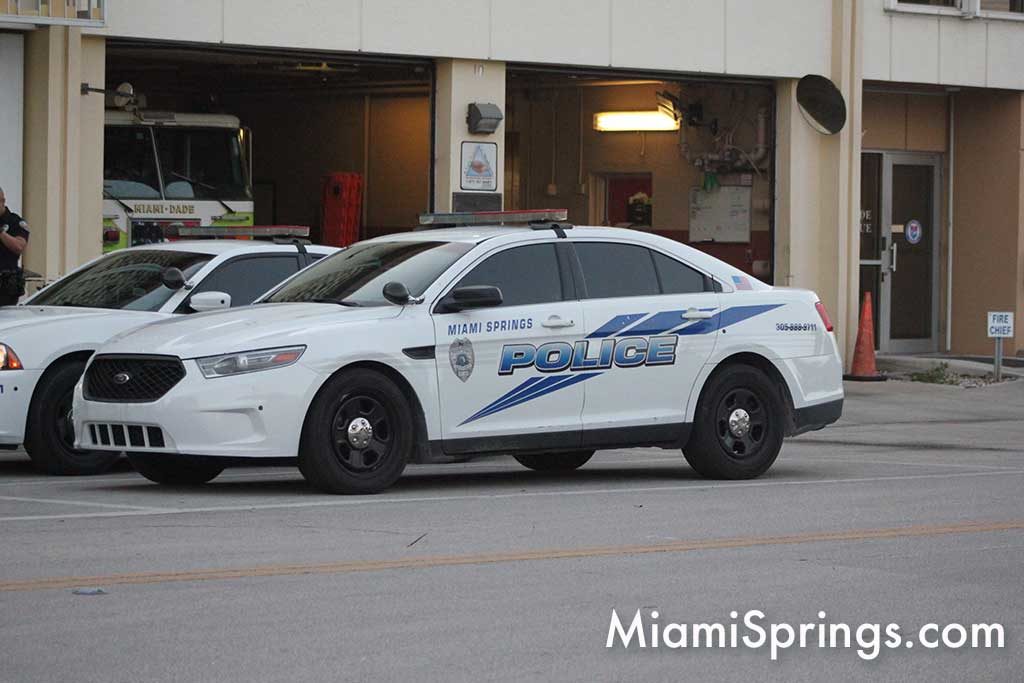Miami Springs Police (along with all Florida Law Enforcement) will now be able to give you a ticket for “Texting While Driving” under a new law that went into effect on July 1st.

But what is “Texting While Driving?” Does it mean I can read text messages, but can’t send a text? Does it mean I can read an email? Does it mean I can’t touch my phone at all while I drive?
First of all, let’s just say that you should always be paying attention to the road ahead and not on your phone. But people use their phones to help with everything from making phone calls, to finding the nearest gas station, to avoiding heavy traffic. So it’s important to understand what is and is not allowed under the new Florida law. For example, is it okay to use WAZE or Google Maps while driving?

Let’s look at the new law and what it does:
What is Driving While Distracted?
“Driving while distracted” means the inattentive operation of a motor vehicle.
Inattentive or distracted driving conduct includes:
- Reading
- Writing
- Performing personal grooming
- Applying a beauty aid or similar products
- Interacting with pets or unsecured cargo
- Using a personal wireless communications device
- Engaging in any other activity, conduct, task, or action that causes distraction.
PRIMARY OFFENSE
Previously, an officer could give you a ticket for texting while driving, but only as a secondary offense. For example, say you were doing 45mph on Ludlam. The cops could pull you over for speeding, and then give you an additional ticket for texting on your phone, while you were speeding.
Now, it’s a primary offense. That means if you’re doing 30mph down Westward Drive, but you’re texting on your phone, the Miami Springs Police, can pull you over can give you a citation for just the texting.
What if I’m at a red light?
If the vehicle is stationary (not moving) you are allowed to text. A motor vehicle that is stationary is not subject to the prohibition. In other words, if you’re stopped at the train tracks on Royal Poinciana Boulevard or stuck in traffic on Hook Square (and are not moving) you are allowed to text from the driver’s seat.
Can I Text in My Tesla with Auto-Pilot?
If you’re operating a vehicle, like a Tesla, in autonomous mode, you are allowed to text since the car is on auto-pilot. However, if you’re on a car with adaptive cruise control, you still need to keep the phone away. Adaptive cruise control does not steer for you.
Can I call 911 While Driving?
Yes. One of the exceptions is the reporting of an emergency or criminal or suspicious activity to law enforcement authorities.
Emergency Alerts
You’re allowed to read safety related information, including emergency, traffic, or weather alerts. So if you’re driving and you get an alert of a tornado warning, you are allowed to read it.
Can I Use My Phone for Navigation?
The law states you can use a device or system in a hands-free manner for navigation purposes.
Can A Cop Take My Phone?
No. Only in the event of a crash resulting in death or serious bodily injury, as defined in s. 316.027, a user’s billing records for a wireless communications device or the testimony of or written statements from appropriate authorities receiving such messages may be admissible as evidence in any proceeding to determine whether a violation of paragraph has been committed.
Can I Still Make Phone Calls?
Yes. You can still make phone calls. It’s preferred that phone calls be made with a wireless device, but you can still hold your phone to your ear. However, you cannot drive and physically dial the numbers on your phone. That’s considered “writing.” You can also not look at your phone to scroll through your contact list. That’s considered reading. You can activate your smartphone feature and use voice activated features like: “Call my wife.”
Questions / Feedback
Got more questions? Let us know what you think of the new law and / or send us your questions by emailing us at feedback@MiamiSprings.com or post your comments below or on social media.
Full Text of the Law:
Want to get more technical? Here’s the full text of the law:
An act relating to driving while distracted; amending s. 316.305, F.S.; revising the short title; defining the term “driving while distracted”; redefining the term “wireless communications device”; revising legislative intent; prohibiting a person from operating a motor vehicle when driving while distracted; authorizing a law enforcement officer during a specified period to stop motor vehicles to issue warnings to persons who are driving while distracted; providing for repeal of a provision; authorizing a law enforcement officer, after a specified date, to stop motor vehicles and issue citations to persons who are driving while distracted; revising exceptions to such prohibition; revising crash results for which a user’s billing records for a wireless communications device or the testimony of or written statements from certain authorities are admissible as evidence; requiring that law enforcement officers indicate specified information in the uniform traffic citation; providing penalties for driving while distracted; authorizing participation in a distracted driving safety program for a first offense, in lieu of specified penalties; authorizing a clerk of the court to dismiss a case and assess court costs under certain circumstances; requiring the deposit of fines into the Emergency Medical Services Trust Fund; deleting a provision requiring that enforcement of this section be accomplished only as a secondary action; authorizing the Department of Highway Safety and Motor Vehicles, in consultation with the Department of Transportation, to implement a statewide campaign to raise awareness and prevent drivers from driving while distracted; authorizing the department to use certain messaging to implement the campaign; authorizing the department to contract with certain entities for certain purposes; providing contract authority; providing effective dates.
Be It Enacted by the Legislature of the State of Florida:
Section 1. Effective October 1, 2019, section 316.305, Florida Statutes, is amended to read:
316.305 Driving while distracted; prohibition.—
(1) This section may be cited as the “Florida Driving While Distracted Law.”
(2) For purposes of this section, the term:
(a) “Driving while distracted” means the inattentive operation of a motor vehicle. Inattentive or distracted driving conduct includes reading, writing, performing personal grooming, applying a beauty aid or similar products, interacting with pets or unsecured cargo, using a personal wireless communications device, or engaging in any other activity, conduct, task, or action that causes distraction.
(b) “Wireless communications device” means any handheld device that is designed or intended to receive or transmit text-or character-based messages, to record or view images, to access or store data, or to connect to the Internet or any communications service, as defined in s. 812.15, or which allows text communications. The term includes, but is not limited to, a cell phone, a tablet, a laptop, a two-way messaging device, or 62an electronic game that is used or capable of being used in a handheld manner. The term does not include a safety, security, or convenience feature built into a motor vehicle which does not require the use of a handheld device.
(3) It is the intent of the Legislature to:
(a) Improve roadway safety for all vehicle operators, vehicle passengers, bicyclists, pedestrians, and other road users.
(b) Prevent crashes related to the act of driving while distracted when operating a motor vehicle.
(c) Reduce injuries, deaths, property damage, health care costs, health insurance rates, and automobile insurance rates related to motor vehicle crashes.
(d) Authorize law enforcement officers to stop motor vehicles and issue citations to persons who are texting while driving while distracted as provided in subsection (4).
(4)(a)1. A person may not operate a motor vehicle when driving while distracted. For the purposes of this paragraph, a motor vehicle that is stationary is not being operated and is not subject to the prohibition in this paragraph.
2.a. During the period of October 1, 2019, through December 31, 2019, a law enforcement officer may stop motor vehicles to issue verbal or written warnings to persons who are driving while distracted for the purposes of informing and educating such persons. This sub-subparagraph shall stand repealed on October 1, 2020.
b. After December 31, 2019, a law enforcement officer may stop motor vehicles and issue citations to persons who are driving while distracted.
(b) Paragraph (a) does not apply to a motor vehicle operator who is:
1. Performing official duties as an operator of an authorized emergency vehicle as defined in s. 322.01, a law enforcement or fire service professional, or an emergency medical services professional.
2. Reporting an emergency or criminal or suspicious activity to law enforcement authorities.
3. Receiving messages that are:
a. Related to the operation or navigation of the motor vehicle;
b. Safety-related information, including emergency, traffic, or weather alerts;
c. Data used primarily by the motor vehicle; or
d. Radio broadcasts.
4. Using a device or system in a hands-free manner for navigation purposes.
5. Using a wireless communications device hands-free or hands-free in voice-operated mode, including, but not limited to, a factory-installed or after-market Bluetooth device.
6.Operating an autonomous vehicle, as defined in s. 316.003, in autonomous mode.
(c) Only in the event of a crash resulting in death or serious bodily injury, as defined in s. 316.027, a user’s billing records for a wireless communications device or the testimony of or written statements from appropriate authorities receiving such messages may be admissible as evidence in any proceeding to determine whether a violation of paragraph (a) has been committed.
(d) Law enforcement officers must indicate the type of distraction in the comment section of the uniform traffic citation.
(5)(4)(a) Any person who violates this section commits a noncriminal traffic infraction, punishable as a moving violation, as provided in chapter 318, and shall have 3 points assessed against his or her driver license as set forth in s. 148 322.27. For a first offense under this section, in lieu of the penalty specified in s. 318.18 and the assessment of points, a person who violates this section may elect to participate in a distracted driving safety program approved by the Department of Highway Safety and Motor Vehicles. Upon completion of such program, the penalty specified in s. 318.18 and associated costs may be waived by the clerk of the court and the assessment of points must be waived.
(b) The clerk of the court may dismiss a case and assess court costs in accordance with s. 318.18(11)(a) for a nonmoving traffic infraction for a person who is cited for a first time violation of this section if the inattentive or distracted driving conduct resulting in the violation is for the use of a personal wireless communications device and the person shows the clerk proof of purchase of equipment that enables his or her personal wireless communications device to be used in a hands-free manner.
(6)(5) Notwithstanding s. 318.21, all proceeds collected pursuant to s. 318.18 for violations of this section must be remitted to the Department of Revenue for deposit into the Emergency Medical Services Trust Fund of the Department of Health.
Section 2. (1) The Department of Highway Safety and Motor Vehicles, in consultation with the Department of Transportation, may implement a statewide campaign to raise awareness and prevent drivers from driving while distracted. The Department of Highway Safety and Motor Vehicles may use television messaging, radio broadcasts, print media, digital strategies, social media, and any other form of messaging deemed necessary and appropriate by the department to implement the campaign.
(2) The Department of Highway Safety and Motor Vehicles may contract with counties, local law enforcement agencies, safety councils, and public schools to assist with planning and conducting the statewide driving while distracted safety and public awareness campaign in a manner that encourages compliance with s. 316.305, Florida Statutes.
Section 3. Except as otherwise expressly provided in this act, this act shall take effect July 1, 2019.



















